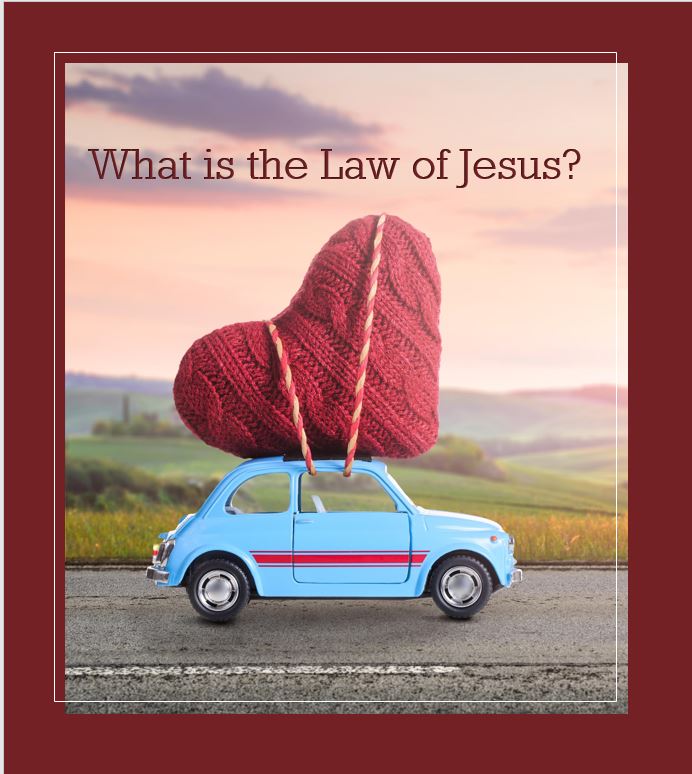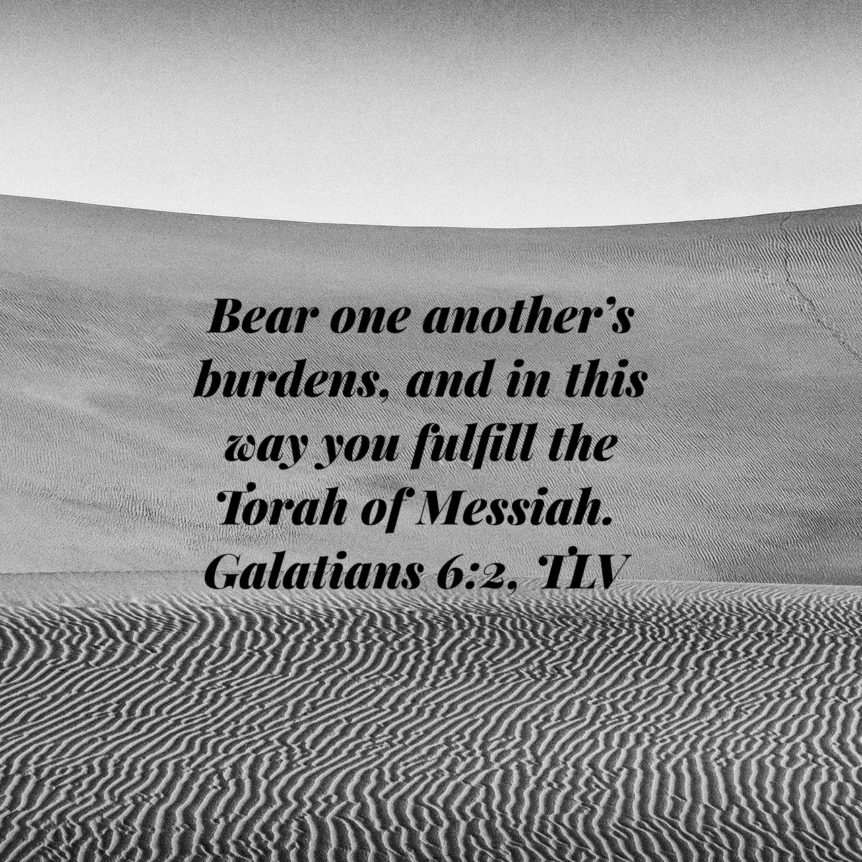Bear one another’s burdens, and in this way you fulfill the Torah [Law] of Messiah. Galatians 6:2, TLV

What is the “Law” of Messiah? That question has been debated for centuries, even more so in the last three or four decades. Most folks believe the Law of the Messiah was referring to a conversation Jesus had with a Pharisee — a scholar and one who studied the Law.
Since there are two different accounts in the Gospels, we either have two different point-of-views of the same conversation, or there were two different encounters.
Matthew’s account (Matthew 22:34-40) has Yeshua in a debate with the Sadducees, a group of scholars who didn’t believe in the resurrection because they felt that only the Torah — Genesis through Deuteronomy — were canonized. All the other writings — writings of history, psalms, proverbs, even the prophets — were not valid.
The Pharisees probably took great pleasure in Yeshua showing up their rivals, but they wanted to test Him, too.
“And testing Him, one of them, a lawyer, asked, “Teacher, which is the greatest commandment in the Torah?” Matthew 22:35-36, TLV [Emphasis Mine]
Of course, what Jesus responded with is what every Jewish child was taught by their parents for thousands of years:
And He said to him, “‘You shall love ADONAI [the LORD] your God with all your heart, and with all your soul, and with all your mind.’ This is the first and greatest commandment. And the second is like it, ‘You shall love your neighbor as yourself.’” Matthew 22:37-39, TLV
But, I love Mark’s version (Mark 12:28-34) for three reasons. First, because the Pharisee truly wanted to know if Yeshua knew the Scriptures, his test was not about trickery, but about curiosity. The second reason, Yeshua’s answer began with the Shema [Hebrew for Hear or Listen].
“Yeshua answered, “The first is, ‘Shema Yisrael, ADONAI Eloheinu, ADONAI echad. Hear, O Israel, the Lord our God, the Lord is One.” (vs. 29) Which is the ancient Jewish prayer and declaration taken from Deuteronomy 6:4-5.
Finally, I loved Mark’s account because the man’s sincerity resulted in being satisfied with Yeshua’s answer and Yeshua commending the man (vss. 32-34).
Others might believe that what was written in John chapters 13, 14, and 15 was the Law of Messiah. Essentially:
“This is My commandment, that you love one another just as I have loved you.” John 15:12
So, is this the Law of Messiah? I don’t believe it is. Not in the conventional way that has been taught.
I believe the Law of Messiah was given on a hill overlooking Lake of Gennesaret (Sea of Galilee) and Capernaum, the fishing town on the northern shore of the Lake of Gennesaret.
What many refer to as the Sermon on the Mount. Matthew chapter 5 was a clear investment in the Law — the Law of Messiah. Jesus’ teaching was that what was written on tablets, scrolls, and papyri were words that now needed to be engraved on the hearts of every child of God.
Sound familiar? It should. This was the prophecy from Jeremiah 31 that God would one day engrave His law on the hearts of His children (Jeremiah 31:32).
What Jesus taught on that hill was that every Law in the Torah had a “heart-factor.” Essentially, he said, “Good for you that you don’t commit adultery, but if you have looked upon another with thoughts of lust, then you broke the commandment of ‘Thou shalt not commit adultery.’”
Yikes.
Yeshua was saying the Law needs to go deeper into our hearts — be part of our thoughts and motives, not just our behavior.
The Law of the Messiah gave us more responsibilities to look deeper to understand what our Heavenly Father wants for His redeemed children. A personal accountability. Because, this Law was intended, as was the Torah, to help God’s people walk out faith in the most difficult of situations.
The complexities and the simplicity we will learn from the “Law of Messiah” we will learn for the rest of our lives. It’s our sanctification process. That miraculous work that goes on under Yeshua’s robe of righteousness that covers us.
Anyway. That’s what this non-scholar thinks. How about you?




YAHUSH Messiah is the spirit of truth, what he taught became spiritual Law. The Hebrew idom says that if a word is spoken 2 times it becomes law. And Apostle Paul who was taught by the same spirit, and called by Yahusha himself. The Law of Messiah is the entire scriptures. All Parables , mysteries and Keys of David. It’s time to learn what he taught. Milk are baby keys, Earth, in scripture is always man, but earth is earth it’s how it’s phrased. Mountain in scripture wham you read, is man Mindset, Heaven when you dig deep into Ancient Hebrew is also your mindset. I have been in the Assembly Of The Holy Apostles for 7 years and this Apostle Found the original teaching of Yahusha He taught his disciples, and their students, Apostles Mark started a Sacred School of Learning, in Alexandria Egypt, he trained faithful men and women to also go teach. Some of them about 70 ( all martyred ) wrote Epistles, as Paul taught. The Mysteries of the kingdom were All the Original Apostles knew and worked with these men, all taught the exact same teachings subjects and exact writings on the subjects they taught His kingdom teaching. Which are to ingrafting by the spirit into your soul. Fire teaching designed by the Master when taught by an man that can hear the spirit tell him. The Law and the prophets were not done away with. But the law became spiritual law. Example, thou shalt not kill! ( yes still in the natural don’t kill another man! But the spiritual, thou shall not kill another by teachings them false deaf letter because it is death to those teaching false things, and it kills others that believe falsehoods.
a long time after YAHUSHS Resurrection. But then the Romans killed them one by one, and students fled what the Romans were doing . Them no one was left, for over 1700 years his Mysteries were not taught. But this Assembly has the teaching and teaching the spiritual understanding, wisdom, knowledge , understanding,
There are over 200 teachings of them on SoundCloud, but their not easy to understand, one must have the Yahusha name, and That would be the right spirit, making them the right Gospel ( mysteries) otherwise with a different spirit which is false spirit, your ears are blocked and a vail is over your eyes.
We only teach the Mysteries , water of the word ( Deut.32:2) teachings come as Rain, those baby Keys are legit and can be used . But one must learn the spiritual knowledge, and Hear the words in order to get faith to believe. Burden in Ancient Hebrew is seed , grain( meat) and water, corn ( mystery) . Let him carry your burdens ( old false teachings ) and take his yolk( yolk is seeds) mysteries word. Take my yolk ( teachings) upon you and learn of me: The Assemble of the Holy Apostles, SoundCloud, free app. Teaching the Mysteries of the Kingdom.